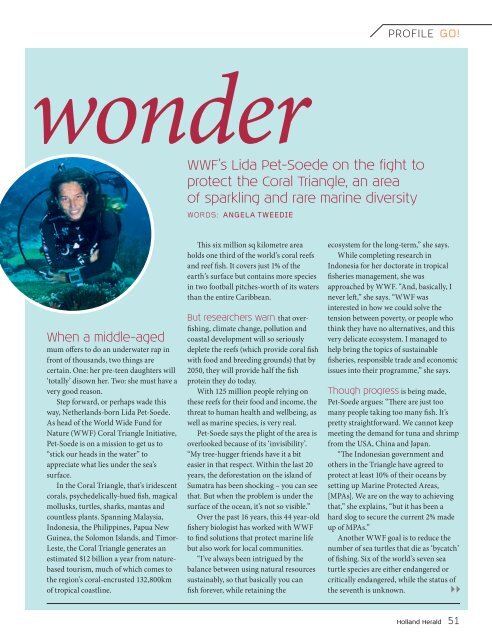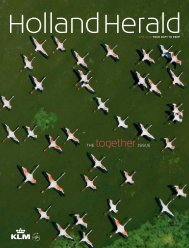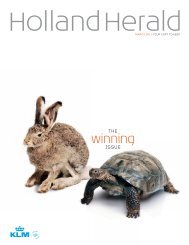june-2012
june-2012
june-2012
You also want an ePaper? Increase the reach of your titles
YUMPU automatically turns print PDFs into web optimized ePapers that Google loves.
PROFILE GO!<br />
wonder<br />
WWF’s Lida Pet-Soede on the fi ght to<br />
protect the Coral Triangle, an area<br />
of sparkling and rare marine diversity<br />
When a middle-aged<br />
mum off ers to do an underwater rap in<br />
front of thousands, two things are<br />
certain. One: her pre-teen daughters will<br />
‘totally’ disown her. Two: she must have a<br />
very good reason.<br />
Step forward, or perhaps wade this<br />
way, Netherlands-born Lida Pet-Soede.<br />
As head of the World Wide Fund for<br />
Nature (WWF) Coral Triangle Initiative,<br />
Pet-Soede is on a mission to get us to<br />
“stick our heads in the water” to<br />
appreciate what lies under the sea’s<br />
surface.<br />
In the Coral Triangle, that’s iridescent<br />
corals, psychedelically-hued fi sh, magical<br />
mollusks, turtles, sharks, mantas and<br />
countless plants. Spanning Malaysia,<br />
Indonesia, the Philippines, Papua New<br />
Guinea, the Solomon Islands, and Timor-<br />
Leste, the Coral Triangle generates an<br />
estimated $12 billion a year from naturebased<br />
tourism, much of which comes to<br />
the region’s coral-encrusted 132,800km<br />
of tropical coastline.<br />
WORDS: ANGELA TWEEDIE<br />
Th is six million sq kilometre area<br />
holds one third of the world’s coral reefs<br />
and reef fi sh. It covers just 1% of the<br />
earth’s surface but contains more species<br />
in two football pitches-worth of its waters<br />
than the entire Caribbean.<br />
But researchers warn that overfi<br />
shing, climate change, pollution and<br />
coastal development will so seriously<br />
deplete the reefs (which provide coral fi sh<br />
with food and breeding grounds) that by<br />
2050, they will provide half the fi sh<br />
protein they do today.<br />
With 125 million people relying on<br />
these reefs for their food and income, the<br />
threat to human health and wellbeing, as<br />
well as marine species, is very real.<br />
Pet-Soede says the plight of the area is<br />
overlooked because of its ‘invisibility’.<br />
“My tree-hugger friends have it a bit<br />
easier in that respect. Within the last 20<br />
years, the deforestation on the island of<br />
Sumatra has been shocking – you can see<br />
that. But when the problem is under the<br />
surface of the ocean, it’s not so visible.”<br />
Over the past 16 years, this 44 year-old<br />
fi shery biologist has worked with WWF<br />
to fi nd solutions that protect marine life<br />
but also work for local communities.<br />
“I’ve always been intrigued by the<br />
balance between using natural resources<br />
sustainably, so that basically you can<br />
fi sh forever, while retaining the<br />
ecosystem for the long-term,” she says.<br />
While completing research in<br />
Indonesia for her doctorate in tropical<br />
fi sheries management, she was<br />
approached by WWF. “And, basically, I<br />
never left ,” she says. “WWF was<br />
interested in how we could solve the<br />
tension between poverty, or people who<br />
think they have no alternatives, and this<br />
very delicate ecosystem. I managed to<br />
help bring the topics of sustainable<br />
fi sheries, responsible trade and economic<br />
issues into their programme,” she says.<br />
Though progress is being made,<br />
Pet-Soede argues: “Th ere are just too<br />
many people taking too many fi sh. It’s<br />
pretty straightforward. We cannot keep<br />
meeting the demand for tuna and shrimp<br />
from the USA, China and Japan.<br />
“Th e Indonesian government and<br />
others in the Triangle have agreed to<br />
protect at least 10% of their oceans by<br />
setting up Marine Protected Areas,<br />
[MPAs]. We are on the way to achieving<br />
that,” she explains, “but it has been a<br />
hard slog to secure the current 2% made<br />
up of MPAs.”<br />
Another WWF goal is to reduce the<br />
number of sea turtles that die as ‘bycatch’<br />
of fi shing. Six of the world’s seven sea<br />
turtle species are either endangered or<br />
critically endangered, while the status of<br />
the seventh is unknown.<br />
Holland Herald 51

















